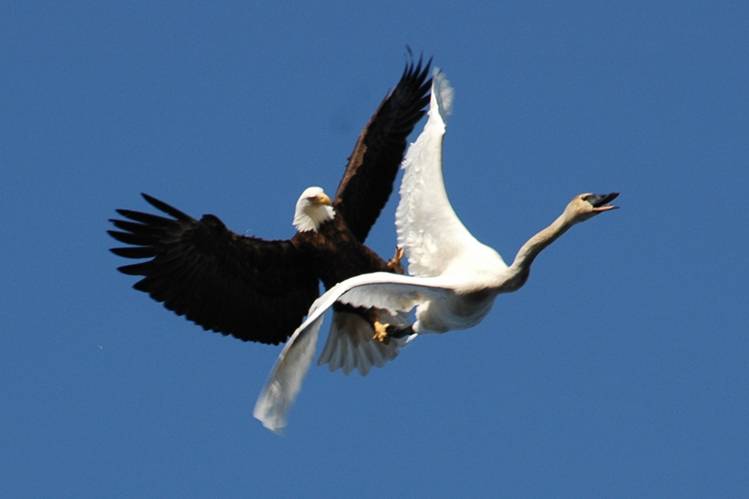Consumer-Resource Interactions
You are here

Consumer-Resource Interactions
In Times of Global Environmental Change
To be announced
Scope
 All organisms require inputs of energy and/or materials in order to grow and reproduce. Consumer-resource interactions in all its variations (i.e., plant-nutrient, plant-herbivore, predator-prey, host-parasitoid, and host-parasite) are central to ecological and evolutionary research. However, consumer-resource interactions are also the basis of exploitative competition (two or more consumers share resources), facilitation (one consumer increases resources for another) and many mutualisms (species trade 'resources'). Most organisms function as both consumers and resources in a food web. The functional and numerical responses of the consumer and a function describing resource population growth are essential components of any consumer-resource interaction. Understanding these responses often requires that we understand the adaptive processes - behaviour, phenotypic plasticity and evolution - that shape these interactions on both short and long time-scales.
All organisms require inputs of energy and/or materials in order to grow and reproduce. Consumer-resource interactions in all its variations (i.e., plant-nutrient, plant-herbivore, predator-prey, host-parasitoid, and host-parasite) are central to ecological and evolutionary research. However, consumer-resource interactions are also the basis of exploitative competition (two or more consumers share resources), facilitation (one consumer increases resources for another) and many mutualisms (species trade 'resources'). Most organisms function as both consumers and resources in a food web. The functional and numerical responses of the consumer and a function describing resource population growth are essential components of any consumer-resource interaction. Understanding these responses often requires that we understand the adaptive processes - behaviour, phenotypic plasticity and evolution - that shape these interactions on both short and long time-scales.
This one-week course will illustrate how adopting a consumer-resource approach can change our understanding of interactions, and how adaptive processes can be important in understanding both academic and applied problems in ecology. This edition of the course will focus on consumer-resource interactions in times of global environmental change at three levels of integration: the individual-population level, the community-ecosystem level and the socio-ecological level. Consumer-resource interactions at each of these levels of integration will be introduced by world-renowned experts, with a focus on the latest developments and ongoing research efforts. The introductions will provide the starting point for practical work by the participants to make the acquired knowledge operational. To this end, sub-groups are challenged to develop ideas for their own research: analysing their own data, writing a proposal, planning an experiment, developing a model or writing a paper. The lecturers and organisers will be available to all groups during the practical work, allowing participants intensive interaction with them. The main goal of the course will be achieved if the participants acquire novel ideas and techniques for their own research. Aside from updating and deepening your scientific knowledge in the field of consumer-resource interactions, this course also offers an excellent opportunity to broaden your network and to interact with world-class scientists in the field!
Sometimes, our PhD courses can even lead to scientific journal articles, such as this one by Jim de Fouw (who participated in the 2014 edition of the course) and his colleagues: https://www.ncbi.nlm.nih.gov/pmc/articles/PMC6113270/ (note the comment in the acknowledgements section)!
Programme
On Sunday evening, we start with warming-up lectures by the organisers. Then, on Monday, the basics of consumer-resource interactions and the topics will be introduced. After that, work groups will be formed. During the following days, there will be lectures on specific topics, followed by discussion. The rest of the day will be spent on the practical work, under the supervision of the lecturers and the organisers. On the last day, the groups present their practical work to all participants.
The programme of the last edition of this course (December 2018) can be downloaded here.
Speakers
World-renowned experts / lecturers contributing to the course:
- Joel Brown, University of Illinois at Chicago
- Don DeAngelis, USGS & University of Miami
- John Fryxell, University of Guelph
- Bob Holt, University of Florida
Course organisers
- Wolf Mooij, Aquatic Ecology, Netherlands Institute of Ecology / Aquatic Ecology and Water Quality Management, Wageningen University
- Bart Nolet, Animal Ecology, Netherlands Institute of Ecology / Theoretical and Computational Ecology, University of Amsterdam
- Frank van Langevelde, Resource Ecology, Wageningen University
General information
| Target Group | The course is aimed at PhD candidates and other academics |
| Group Size | Min. 25, max. 40 participants |
| Course duration | 5 days |
| Language of instruction | English |
| Frequency of recurrence | Every three years |
| Number of credits | 1.5 ECTS |
| Lecturers | Prof. Joel Brown (University of Illinois at Chicago, USA), Prof. Bob Holt (University of Florida, USA), Prof. John Fryxell (University of Guelph, Canada), Prof. Don DeAngelis (University of Miami, USA), Prof. Wolf Mooij and Dr. Bart Nolet (Netherlands Institute of Ecology), Dr. Frank van Langevelde (Resource Ecology group, Wageningen University) |
| Prior knowledge | Basic knowledge of consumer-resource interactions is required. Basic knowledge on modelling is helpful but not essential. |
| Location | To be determined |
More information
Claudius van de Vijver (PE&RC)
Phone: +31 (0) 317 485116
Email: claudius.vandevijver@wur.nl
Lennart Suselbeek (PE&RC)
Phone: +31 (0) 317 485426
Email: lennart.suselbeek@wur.nl
Registration of interest
At this moment, this course is not scheduled yet. However, if you register your interest in this activity below, we will inform you as soon as the course is scheduled and registration of participation is opened.
